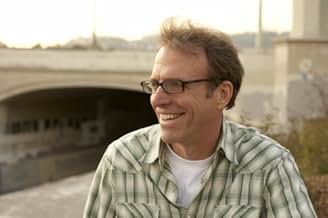Kirby Dick's exposé about the American movie ratings board.Kirby Dick's exposé about the American movie ratings board.Kirby Dick's exposé about the American movie ratings board.
- Director
- Writers
- Stars
- Awards
- 4 wins & 3 nominations total
Clark Baker
- Self - Private Investigator
- (as Clark)
- Director
- Writers
- All cast & crew
- Production, box office & more at IMDbPro
Featured reviews
Since the Hays Code, filmmakers have had a lot more freedom over the content of their films. However, the MPAA ratings board still does exercise a certain de facto censorship power. Most people do not realize this.
"This Film is not Yet Rated" exposes the arbitrariness, secrecy, and bias of the MPAA ratings board and makes the viewer question why movies receive the ratings they do.
Kirby Dick puts together a nice cross-section of directors and "talking heads" who discuss the MPAA ratings board's biases when it comes to realism, sex, violence, gay themes, and other taboo issues in films.
Dozens of major directors have had problems with the MPAA ratings board - they either received the NC-17 (or the old "X") rating or had to cut their films to meet the requirements of the ratings board. Some examples are: Kubrick, Tarantino, Lynch, Woo, Friedkin, Peckinpah, Aronofsky, and countless others.
This film exposes the fact that the ratings board is made up of people who are given NO criteria and NO training for rating films, so they basically use their own personal (and obviously heavily biased) judgments to decide what rating a particular movie should receive.
This is an important film because so few people realize how movies are rated in the U.S. Even fewer realize how problematic (biased, anti-democratic, non-transparent, not accountable) our system is.
It is also well put together, so it is easier to watch than most documentaries.
I would have liked to have heard more comparisons between the U.S. rating system and others worldwide, something that was only briefly touched upon.
9 out of 10
"This Film is not Yet Rated" exposes the arbitrariness, secrecy, and bias of the MPAA ratings board and makes the viewer question why movies receive the ratings they do.
Kirby Dick puts together a nice cross-section of directors and "talking heads" who discuss the MPAA ratings board's biases when it comes to realism, sex, violence, gay themes, and other taboo issues in films.
Dozens of major directors have had problems with the MPAA ratings board - they either received the NC-17 (or the old "X") rating or had to cut their films to meet the requirements of the ratings board. Some examples are: Kubrick, Tarantino, Lynch, Woo, Friedkin, Peckinpah, Aronofsky, and countless others.
This film exposes the fact that the ratings board is made up of people who are given NO criteria and NO training for rating films, so they basically use their own personal (and obviously heavily biased) judgments to decide what rating a particular movie should receive.
This is an important film because so few people realize how movies are rated in the U.S. Even fewer realize how problematic (biased, anti-democratic, non-transparent, not accountable) our system is.
It is also well put together, so it is easier to watch than most documentaries.
I would have liked to have heard more comparisons between the U.S. rating system and others worldwide, something that was only briefly touched upon.
9 out of 10
This movie is informative, but also funny and clever and kind of mind-blowing. It's not for the faint of heart because it contains quite a bit of graphic footage to illustrate the point that the ratings board is totally arbitrary (in fact, one former board member says there is absolutely no training or standards -- you come in on your first day and start to rate movies). That may seem not to matter, but it matters quite a bit to the film makers whose films are being rated and several appear in the film and make very strong arguments for why the rating their film received was unfair. There are also interviews with several other people (like a free speech lawyer) who add context to Kirby Dick's expose. This really is a must see for anyone who cares about movies and it's a lot of damn fun too.
Fast paced, absorbing, at times comical exposé of the Motion Picture Association of America (MPAA) film rating system. While it is in name a "voluntary" system, i.e., a filmmaker can choose whether to submit a film to MPAA for rating purposes, in fact the theater chains that promise wide exposure and revenues for a film they screen will rarely touch a movie that is unrated or that receives the most restrictive rating, NC-17 (no "child" 17 or younger admitted under any circumstances.) The ratings are allegedly created by a panel of "average" parents of school age children, according to long time MPAA CEO, Jack Valenti, and other officials. There are no experts, e.g., no psychologists who study the impact of media on kids' attitudes and behavior. Panel members are selected by the rating committee chair, Joan Graves. Members' identities are kept secret to "avoid pressures" on their decision making.
Among other things, director Kirby Dick discovers that (a) there are no explicit criteria or guidelines for ratings; (b) ditto for selection of raters (who, if they work full time, receive annual salaries of $30,000); (c) one recent rater was childless; the children of several others were adults; (d) raters frequently discuss films with industry representatives, arguably the most important source of "pressure" on their decisions; (e) majority votes determine the recommended rating, but these votes are not binding; (f) in case of ties (there are eight voting members, including Ms. Graves), Ms. Graves also is empowered to cast a tie-breaking judgment; and (g) there is an appeals process.
However, the appeals board is composed exclusively of representatives of the major studios, distributors and exhibition chains, and rarely do they controvert the initial rating. This is no surprise, since the MPAA is entirely financed by the six largest studios (responsible for 90% of the films released domestically) and their conglomerate corporate media owners (who control 95% of all media outlets in the U.S.) Details of all rating board and appeal decisions are kept secret. To create the illusion of transparency, two clergymen, representing Roman Catholics and Protestants, always sit in as observers at appeals hearings. But they too are required not to disclose information on the appeal decision process.
Compared to a number of other rating systems that exist in various countries worldwide, the MPAA approach is by far the most secretive, and contrary to every other system, it is far more restrictive of sexual content than violence. Kirby Dick also cites examples that strongly suggest greater bias (i.e., greater likelihood of getting an NC-17 rating) against films depicting gay/lesbian sex scenes than those with heterosexual scenes.
Dick mixes illustrative film clips, talking heads, historical notes on the evolution of ratings, a rundown on what appear to be the implicit criteria for ratings; a stalking investigation to discover the identities of raters and appeal board members; and his personal experience in submitting an earlier cut of this film to MPAA for a rating (it got an NC-17 for sexually explicit content). Atom Egoyan, Kimberly Peirce, Kevin Smith and John Waters are among independent filmmakers interviewed by Dick. Ms. Peirce raises the interesting notion that MPAA ratings may also be more biased against films with scenes connoting female sexual pleasure than films showing male pleasure.
Dick generally maintains a tone of wry humor, especially in showing us his day-by-day use of private investigators to track down and identify raters. There's almost a Keystone Cops flavor to the stalking antics of the women PIs he has hired, with Dick along for the ride. His re-creation of phone conversations with Joan Graves and the MPAA Chief Counsel, when he protests the rating of his own film, are also as funny as they are biased. (He uses animation to visually depict these officials as mean spirited grumps in split screen scenes that simultaneously show real time footage of Dick himself at his end of these conversations.) Dick is less successful in his review of information suggesting the implicit or inferable criteria raters use, based on film content and actual ratings. He zips through too much information too fast for anybody to absorb. Still, this is a bravura piece of advocacy journalism. The film gives us ample information to conclude that the MPAA system of corporate control of ratings, when combined with control of film distribution and screening based on these ratings, effectively results in a clever censorship arrangement that would certainly violate First Amendment rights were it not for the illusion of "voluntariness" that is perhaps the most ingenious aspect of this system.
Anybody is free to make a film about anything, of course. But whether it will be screened, or even advertised, let alone able to return revenues sufficient to defray the costs of production, is a very carefully controlled process. And what is the point of making a film that will not be seen? As in political campaigning, free speech is hardly free. Those with the most corporate clout rule both the campaigning and movie making businesses. What's worse, in our characteristic American manner, we shrink puritanically from sex on screen but remain inured to the effects of violence. My grade: 7.5/10 (low B+) (Seen on 09/10/06)
Among other things, director Kirby Dick discovers that (a) there are no explicit criteria or guidelines for ratings; (b) ditto for selection of raters (who, if they work full time, receive annual salaries of $30,000); (c) one recent rater was childless; the children of several others were adults; (d) raters frequently discuss films with industry representatives, arguably the most important source of "pressure" on their decisions; (e) majority votes determine the recommended rating, but these votes are not binding; (f) in case of ties (there are eight voting members, including Ms. Graves), Ms. Graves also is empowered to cast a tie-breaking judgment; and (g) there is an appeals process.
However, the appeals board is composed exclusively of representatives of the major studios, distributors and exhibition chains, and rarely do they controvert the initial rating. This is no surprise, since the MPAA is entirely financed by the six largest studios (responsible for 90% of the films released domestically) and their conglomerate corporate media owners (who control 95% of all media outlets in the U.S.) Details of all rating board and appeal decisions are kept secret. To create the illusion of transparency, two clergymen, representing Roman Catholics and Protestants, always sit in as observers at appeals hearings. But they too are required not to disclose information on the appeal decision process.
Compared to a number of other rating systems that exist in various countries worldwide, the MPAA approach is by far the most secretive, and contrary to every other system, it is far more restrictive of sexual content than violence. Kirby Dick also cites examples that strongly suggest greater bias (i.e., greater likelihood of getting an NC-17 rating) against films depicting gay/lesbian sex scenes than those with heterosexual scenes.
Dick mixes illustrative film clips, talking heads, historical notes on the evolution of ratings, a rundown on what appear to be the implicit criteria for ratings; a stalking investigation to discover the identities of raters and appeal board members; and his personal experience in submitting an earlier cut of this film to MPAA for a rating (it got an NC-17 for sexually explicit content). Atom Egoyan, Kimberly Peirce, Kevin Smith and John Waters are among independent filmmakers interviewed by Dick. Ms. Peirce raises the interesting notion that MPAA ratings may also be more biased against films with scenes connoting female sexual pleasure than films showing male pleasure.
Dick generally maintains a tone of wry humor, especially in showing us his day-by-day use of private investigators to track down and identify raters. There's almost a Keystone Cops flavor to the stalking antics of the women PIs he has hired, with Dick along for the ride. His re-creation of phone conversations with Joan Graves and the MPAA Chief Counsel, when he protests the rating of his own film, are also as funny as they are biased. (He uses animation to visually depict these officials as mean spirited grumps in split screen scenes that simultaneously show real time footage of Dick himself at his end of these conversations.) Dick is less successful in his review of information suggesting the implicit or inferable criteria raters use, based on film content and actual ratings. He zips through too much information too fast for anybody to absorb. Still, this is a bravura piece of advocacy journalism. The film gives us ample information to conclude that the MPAA system of corporate control of ratings, when combined with control of film distribution and screening based on these ratings, effectively results in a clever censorship arrangement that would certainly violate First Amendment rights were it not for the illusion of "voluntariness" that is perhaps the most ingenious aspect of this system.
Anybody is free to make a film about anything, of course. But whether it will be screened, or even advertised, let alone able to return revenues sufficient to defray the costs of production, is a very carefully controlled process. And what is the point of making a film that will not be seen? As in political campaigning, free speech is hardly free. Those with the most corporate clout rule both the campaigning and movie making businesses. What's worse, in our characteristic American manner, we shrink puritanically from sex on screen but remain inured to the effects of violence. My grade: 7.5/10 (low B+) (Seen on 09/10/06)
Kirby Dick is a filmmaker I wasn't aware of before This Film is Noy Yet Rated, but now he is assuredly on my radar, if only for the determination in pulling off his main idea. Like Super Size Me, this documentary has a near-gimmick to it; Dick hires a private investigator in order to track down the anonymous "parents" who decide why a movie will be rated R over PG-13, and NC-17 instead of R. This even leads- more intriguingly- into the more deceptive group of appellant board members of the MPAA. So on the one hand the filmmaker has this extremely entertaining, guerrilla-style aspect to his film, with a hand-held camera in one moment in a fast-food place that draws attention to him, and detectives who will go to any length to get results. On the other hand he gets great interviews and clips and history about the film industry in the US and the near fascist style of the MPAA in relation to the several (corporite) studios.
As a film buff this film already had my interest long before I saw it. For too long the topic of film ratings have both infuriated and fascinated me. Much of what ends up going on with filmmakers's battles with the MPAA to get their R (and indeed the difference between millions of dollars in grosses) instead of an NC-17 is staggering. That Kirby Dick get such insight out of the insiders (two of which former MPAA people, and two who kept anonymous), filmmakers, business people, and other types within the industry, is a good help to add to the basic argument that there is some inherent problems with the current ratings system in the country. This is accentuated in comparisons between NC-17 and R rated sex scenes from other movies, and clips from films that received the NC-17- or close to it- and the inanities and problems filmmakers have to get their whole vision against people who, of course, are not that creative. There are issues of gay sex in movies, how violence is vs. sex in allowance in ratings, and in the end how big business (and religion) are behind the scenes if not pulling strings then giving complete influence.
All of this as a documentary ends up being pulled fantastically off, as it does at the core what a documentary mostly should- stir up conversation about the topic(s), and at the same time still being entertained to an extent. And Kirby Dick even has a slight Michael Moore tinge to him as he goes full-on after his subjects; one of which reminded me of Moore's own confrontation with Charleton Heston, as Dick puts himself in split screen with animated caricatures of his callers. But Dick also is smart enough to put such subject matter with good doses of humor. I loved the little animated explanation as to what each rating means (including dead orphan and Almodovar jokes), and as he revealed with a near relish the full facts on every member (most shockingly the appellate members). Even if you just have a casual interest in movies it should be worth your while, and especially if you're a parent- and try not to let the NC-17 rating deter you as it's in part just in spite of the mirror put up to the ratings board itself- it's especially prudent to see. It's got both tongue-in-cheek and dead-serious aspirations, and all the while making Jack Valenti look worse and worse. It's biased, to be sure, but for the right reasons.
As a film buff this film already had my interest long before I saw it. For too long the topic of film ratings have both infuriated and fascinated me. Much of what ends up going on with filmmakers's battles with the MPAA to get their R (and indeed the difference between millions of dollars in grosses) instead of an NC-17 is staggering. That Kirby Dick get such insight out of the insiders (two of which former MPAA people, and two who kept anonymous), filmmakers, business people, and other types within the industry, is a good help to add to the basic argument that there is some inherent problems with the current ratings system in the country. This is accentuated in comparisons between NC-17 and R rated sex scenes from other movies, and clips from films that received the NC-17- or close to it- and the inanities and problems filmmakers have to get their whole vision against people who, of course, are not that creative. There are issues of gay sex in movies, how violence is vs. sex in allowance in ratings, and in the end how big business (and religion) are behind the scenes if not pulling strings then giving complete influence.
All of this as a documentary ends up being pulled fantastically off, as it does at the core what a documentary mostly should- stir up conversation about the topic(s), and at the same time still being entertained to an extent. And Kirby Dick even has a slight Michael Moore tinge to him as he goes full-on after his subjects; one of which reminded me of Moore's own confrontation with Charleton Heston, as Dick puts himself in split screen with animated caricatures of his callers. But Dick also is smart enough to put such subject matter with good doses of humor. I loved the little animated explanation as to what each rating means (including dead orphan and Almodovar jokes), and as he revealed with a near relish the full facts on every member (most shockingly the appellate members). Even if you just have a casual interest in movies it should be worth your while, and especially if you're a parent- and try not to let the NC-17 rating deter you as it's in part just in spite of the mirror put up to the ratings board itself- it's especially prudent to see. It's got both tongue-in-cheek and dead-serious aspirations, and all the while making Jack Valenti look worse and worse. It's biased, to be sure, but for the right reasons.
A look into the mysterious organization that decides what rating a film is given. And all sorts of other issues/arguments that are created because of it. Numerous actors, directors, producers, former MPAA raters and critics share their thoughts on the good and bad of the highly secretive organization.
I have always found "rating reasons" funny and often absurd, which is why I make my own when writing these things. I have also always liked to look into second opinion on things so maybe whoever reads my little IMDb reviews will get that from them. Since, the often disturbing fact for film makers is the rating is something they have to live with and discussing it with the people who decided it is virtually not an option. And that ultimately decides what theaters decided to show it and how much, which is essentially how films money.
The reason as many of you know for the infamous NC-17 rating is sexual content, especially if it is explicit, and that is basically the focus of this film. Which is both good and bad. Good, because they do a pretty good job comparing R-rated and NC-17 rated sex scenes which are not that different. But bad, because the issue of violence (in my opinion the most potentially objectionable thing shown in film) is attended to on a small scale. There are violent PG-13 movies (Ah-nuld's "The 6th Day" for one) which include bone breaking, dismemberment, and you get the picture. While on the other side you have R-rated movies with really minimal or much more accurate depiction of violence (Michael Mann's "Heat" for one). Yet violence as entertainment is condoned, but showing kids what violence really looks like is not. Darren Aronofsky and Kevin Smith make the film's only points on violence and it'll leave you wanting for more.
Also there wasn't a comparison to other countries rating system, just a mention that those systems are a little less absurd, which is true if you look at the rating sections on most IMDb film profiles, but some thought here would have been invaluable to this film's argument.
However, this remains a pleasantly fresh documentary that many, but mainly John Waters (haha), have been waiting for. 8/10
Not Rated, contains: sexual material and some violent clips - There are many clips of sex scenes shown, but are shown and discussed from a critical perspective. The few violent scenes are discussed in the same manner. So bring your kids! They'll finally know what "it's not for you" means.
I have always found "rating reasons" funny and often absurd, which is why I make my own when writing these things. I have also always liked to look into second opinion on things so maybe whoever reads my little IMDb reviews will get that from them. Since, the often disturbing fact for film makers is the rating is something they have to live with and discussing it with the people who decided it is virtually not an option. And that ultimately decides what theaters decided to show it and how much, which is essentially how films money.
The reason as many of you know for the infamous NC-17 rating is sexual content, especially if it is explicit, and that is basically the focus of this film. Which is both good and bad. Good, because they do a pretty good job comparing R-rated and NC-17 rated sex scenes which are not that different. But bad, because the issue of violence (in my opinion the most potentially objectionable thing shown in film) is attended to on a small scale. There are violent PG-13 movies (Ah-nuld's "The 6th Day" for one) which include bone breaking, dismemberment, and you get the picture. While on the other side you have R-rated movies with really minimal or much more accurate depiction of violence (Michael Mann's "Heat" for one). Yet violence as entertainment is condoned, but showing kids what violence really looks like is not. Darren Aronofsky and Kevin Smith make the film's only points on violence and it'll leave you wanting for more.
Also there wasn't a comparison to other countries rating system, just a mention that those systems are a little less absurd, which is true if you look at the rating sections on most IMDb film profiles, but some thought here would have been invaluable to this film's argument.
However, this remains a pleasantly fresh documentary that many, but mainly John Waters (haha), have been waiting for. 8/10
Not Rated, contains: sexual material and some violent clips - There are many clips of sex scenes shown, but are shown and discussed from a critical perspective. The few violent scenes are discussed in the same manner. So bring your kids! They'll finally know what "it's not for you" means.
Did you know
- TriviaThe MPAA announced that starting in March of 2007, it will change their policy and allow filmmakers to cite other film's ratings as comparison. The MPAA will also provide information about the demographics of its board.
- Quotes
John Waters: I also heard on 'A Dirty Shame' - and I have no proof of this - that there were doctors involved... and that some of the kinkier terms, like felching and stuff, that they explained to the MPAA what felching meant. Now, I would like to have heard that because felching, no one has ever done felching. Felching is when you fuck someone and suck your own cum out of their asshole. Well, I know a lot of perverts and I don't know anyone who's done that.
- Crazy creditsAt the end credits a count of what the film shows: FUCKS(OR DERIVATIONS OF): 20 MOTHERFUCKERS: 3 HUMPS: 220 NIPPLES: 10 INTERCOURSE WITH PIE: 1 CARTOONS/PUPPETS IN SEXUAL POSITIONS: 15 SPLOSHING: 1 FELCHING: 0
- ConnectionsEdited into This Film Is Not Yet Rated: Deleted Scenes (2009)
- SoundtracksAppeals Members
Written and Performed by Michael S. Patterson (ASCAP)
Courtesy of Absynthe Zelery Music (ASCAP)
- How long is This Film Is Not Yet Rated?Powered by Alexa
Details
- Release date
- Countries of origin
- Language
- Also known as
- Los censores de Hollywood
- Filming locations
- Production companies
- See more company credits at IMDbPro
Box office
- Gross US & Canada
- $306,845
- Opening weekend US & Canada
- $30,664
- Sep 3, 2006
- Gross worldwide
- $347,240
- Runtime
- 1h 38m(98 min)
- Color
- Sound mix
- Aspect ratio
- 1.85 : 1
Contribute to this page
Suggest an edit or add missing content

































